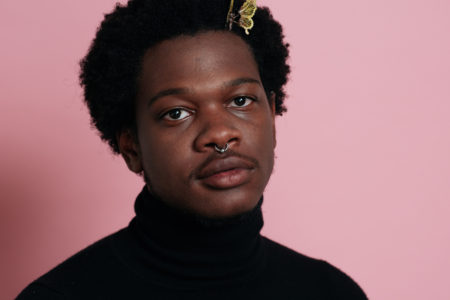Interview with Alex Cohen from Alex Napping

Somewhere between Austin and New York City you’ll find Alex Napping, a guitar-pop quartet consisting of Alex Cohen on guitar and lead vocals, Adrian Sebastian Haynes on guitar, Tomas Garcia-olano on bass, and Andrew Stevens on drums. Despite a major geographic move since their 2014 debut, This Is Not A Bedroom and last year’s follow-up, Trembles Part I & II, their songwriting has never felt tighter on their forthcoming release, Mise En Place.
Cohen is the principal songwriter of Alex Napping, and we caught up with her in New York City.
Northern Transmissions: You’ve given us a teaser with the release of “Living Room,” but I understand that the album as a whole is intended to be a narrative about the formation of a relationship. What was your songwriting process for Mise En Place? Did you have this concept in mind while writing it?
Alex Cohen: No, I didn’t. It’s one of those things where I had written all those songs while in a relationship. Conveniently—well, not conveniently—right around the time I realized I had an album’s worth of songs was also kind of the time that everything started to fall apart with that relationship. As [Alex Napping] got into the actual arranging and recording, I looked back and saw that [the songs] told a narrative about that past relationship and a formative period in my adult life where I was out of college and trying to figure out how to make a career in music and my music identity, while also figuring out how do you be an adult in a relationship, and find balance. It wasn’t a conscious thing at the time.
NT: The culinary definition of mise en place refers to the control that a chef will have over kitchen prep, but there is also the psychology definition, which refers to how small changes in the day to day can lead to larger behavioural changes. The culinary definition refers to structure and organization, and the psychology definition implies an acceptance of chaos and unpredictability. Did your album title choice refer to one of these definitions specifically, or does the album capture the tension in between these definitions?
AC: That’s super interesting. I didn’t know about the psychology definition. I definitely had the culinary definition in mind. The reason for picking that as a title is that throughout most of my life, from adolescence into college and early adulthood, I really looked for structure as a way of controlling things. I always believed that if I did things a certain way, a correct way, I could control a series of events, but that’s not how it works out. A lot of the themes in the album are about embracing uncertainty and the unknown, and accepting that you can’t control everything at all times. So, it’s interesting that you bring up the psychology definition, because I think that’s kind of the point that I arrive at by the end of the record … There are just going to be things you can’t control in life, and it’s easier to focus on the things you can control, and let the other things happen.
NT: Mise En Place has more of a studio produced feel than Trembles Part I & II and This Is Not A Bedroom. And you’re also releasing it on Father/Daughter, a new label for you. Would you say that this album marks some sort of shift for Alex Napping as a band?
AC: Yeah, I think so. We definitely had a lot more time in the studio to work on this record, and I wanted this record to have the feel of something that organically came from being in the studio versus us arranging and rehearsing as a band, and going to the studio and trying to get it done as quickly as possible … I think moving forward, that’s something we all want to explore—the creative process of improvisation and being in the moment, and yielding results from not just rehearsing and coming up with parts. I am more into the versatility of this record, where I feel that this is not a bedroom sound. I think that we cover a lot of sonic ground in [Mise En Place], and that’s something I want to do moving forward, and not necessarily locking ourselves into a genre.
NT: Some themes and arrangements in Mise En Place remind me of Lower Dens’ debut in 2010, Twin-Hand Movement. Jana Hunter had written that album themselves, and found a backing band to help them execute it. I understand that you are also the principal songwriter for Alex Napping. Do you feel a sense of vulnerability opening up your creative practice to group collaboration?
AC: I think that’s something I struggle with having a concrete idea of. I think we’re in a period of time in indie rock where a lot of ‘bands’ are the solo artist, like Car Seat Headrest, Angel Olson or Mitski, the names I can think of off the top of my head. We are a band though, first and foremost. The people in the group have been with me since I started this band. The sounds on the record and the way the songs end up are inherently part of a collaborative process. But at the end of the day, it is still very much my project and I have the final say in everything. It’s weird for me to decide if we’re a band or if it’s my project. Especially because the other guitarist, Adrian, I bring him into the creative process pretty early, before either Andrew or Tomas. He’s super important in fleshing out ideas and arrangements. I have told people this before, if Adrian were not a part of this project anymore I don’t think I would keep the name Alex Napping.
NT: Alex Napping was formed in Austin, Texas, but now you live in New York City. What has New York provided you that Austin didn’t?
AC: I decided to move from Austin because I felt like the energy of the city didn’t match my internal energy anymore, and I’m not sure that it ever did. It is a very chill and relaxed town, and there’s a ton of people that work really hard there—especially creative people like artists and musicians. I have often felt like a lot of peoples’ actions have lacked intention, where they’re busy and working hard because they know that they should be, but there’s not any focus to why they’re doing that or where that energy is directed. I realized it was a super unhealthy environment for me to be in … It was a great place to be when I was figuring out what I wanted to do musically, it served as an incubator for my musical projects, but I reached a point where I realized I had outgrown it. So, I moved to New York. I had been working on another project the year before, so I was coming here a lot. I just felt happier here. I didn’t feel as stressed although I was as busy, and I think that has a lot to do with the pace of [New York]. It’s strange because [New York] is a bigger city and there is a lot more going on, but I do find that within that I enjoy the anonymity of living here a lot more. Being in Austin and part of a music scene there, it’s hard to disappear and do your own thing, but I have a lot more space where I am now.
NT: @alexnapping’s description on Twitter is “The Canadian Division of Sub Pop Circa 2003.” Where did that come from?
AC: That was from when we were starting the band and rehearing the songs. Before we played our first show ever, someone asked, “Oh, what does it sound like?” and Andrew, our drummer, was like, “It’s kind of like the Canadian division of Sub Pop circa 2003” and I thought that was the funniest, cleverist thing ever. Starting the project, talking about bands that influenced us, we kept referencing early 2000s and late ‘90s bands. Broken Social Scene was a big influence for us starting this project and developing a sound, and that statement perfectly captured the things that we wanted sonically at the time.
NT: Alex Napping is still spread between New York and Austin, but do you have plans to tour soon? Is the distance hard?
AC: We will be touring through the East Coast in May, and most likely touring the West Coast in the summer, and then I imagine we’ll be doing more stuff in the fall. We’ll be in Austin for SXSW.
It’s one of those situations where I go to Austin pretty frequently to write stuff and play shows, and the [other band members] have come up here. We’re making it work. I honestly think it’s working better now that I’m in New York. We’re having to be pickier about the things that we do, and it feels more focused.
Interview by Brit Bachmann.
Latest Reviews
Tracks
Advertisement
Looking for something new to listen to?
Sign up to our all-new newsletter for top-notch reviews, news, videos and playlists.









